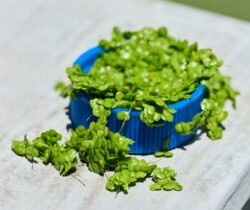Plantible Foods—a startup extracting a highly functional protein from fast-growing aquatic plant lemna—has opened a 140-acre lemna farm in Texas and launched its first product: Rubi Whisk, a plant-based egg replacer it claims can “outperform eggs in many applications.”
Founded in 2016 by Dutch entrepreneurs Tony Martens Fekini and Maurits van de Ven, Plantible has raised just over $30 million from backers including Korean food giant CJ CheilJedang and Kellogg’s venture arm eighteen94 capital.
It has a pilot facility near San Diego that serves as its R&D hub and a larger-scale lemna farm and on-site processing facility in Eldorado, Texas that will serve its first customers this summer.
Rubi Whisk will debut in macarons developed by vegan baker Sweet Maresa’s in New York, with other customers coming online as production ramps up, Martens Fekini told AgFunderNews. “We have multimillion-dollar purchase orders to fulfill as commercial quantities become available this summer.”
‘Multimillion dollar purchase orders’
The core ingredient in Rubi Whisk is RuBisCO (‘Rubi protein’), a protein found in all leafy greens that Plantible extracts from lemna via a multi-step mechanical process that removes chlorophyll and other components to create a complete protein with a neutral taste, odor and color.
With vegan credentials, but functional properties akin to animal proteins (emulsifying, gelation, binding) at low inclusion rates, Rubi Protein is attracting interest in baked goods, meat alternatives, plant-based dairy products, and sports and adult nutrition products. In the US, it is self-GRAS (Generally Recognized as Safe) and can be listed on ingredient labels as ‘lemna leaf protein.’
Rubi Whisk—which can replace eggs in everything from breads and pastries to donuts and cookies— is nearly 100% soluble in water, forms stable emulsions when mixed with oil and water at high speed, and can be whipped into stiff peaks in three minutes, claimed Martens Fekini.
Its high water-holding capacity aids moisture retention in baked goods, while its fat-binding and oil-holding capacity enables bakers to structure unsaturated fats and reduce or remove saturated fats from some recipes, he added. “It actually outperforms eggs in many applications.”
“In over a decade of formulating vegan baked goods, I haven’t found a protein solution that works nearly as well as Plantible’s ingredients do. Not only do their protein ingredients work better than any other plant-based ingredient on the market, but they essentially function just like egg whites in my macarons.” Maresa Volante, founder, Sweet Maresa’s
Why replace eggs?
Food manufacturers are looking to replace eggs for multiple reasons.
For some, it’s about ethics: they feel that industrialized egg production is cruel and environmentally unsustainable. For others, it’s about tapping into the ‘plant-based’ trend, or avoiding allergens. Many brands, meanwhile, have simply been burned too many times by the volatility of the egg market and want to find alternatives that come with more consistent pricing, safety, and availability, said Martens Fekini.
“We’ve seen very recently the havoc that Avian flu has caused in the egg supply chain; most food companies are not commodity price risk managers, they just want a stable supply without having to compromise on their clean labels. And lemna leaf protein is a natural plant-based ingredient that is traceable and easy to understand for consumers.”

A free-floating aquatic plant that grows without pesticides and doubles in mass every 48 hours, lemna (duckweed) has key advantages over other plant protein sources in that it contains all the essential amino acids with a protein digestibility (PDCAAS) score of 1.0 (equivalent to animal protein). It can be harvested in open ponds similar to those in which some algae is grown commercially all year around.
Requiring no arable land and recycling 95% of its water inputs. Plantible’s new site in Texas will have the capacity to produce and ship hundreds of metric tons of Rubi Whisk per year.
Rubi protein potential
While egg replacement is Plantible’s initial focus with Rubi Whisk, it is also developing products featuring Rubi Protein in multiple other application areas, said Martens Fekini.
“In plant-based meat, it can help companies move away from chemical binders such as methylcellulose but also improve mouthfeel and juiciness. In plant-based dairy, we’ve made exciting progress on improving the nutritional quality and texture of products that are often full of oils and starches and lack the functionality provided by animal protein.”
Rubi protein does not have the melt and stretch of casein proteins but can replace whey in multiple applications from yogurt to creamers, milks and cottage cheese, he said.
“Over the past four to five years we’ve been working closely with industrial partners on the evaluation and application of Rubi protein in different verticals, and some of these sales cycles are incredibly long, but now they’ve started to come to fruition. Within the next three to six months, there will be more announcements regarding the commercialization of Rubi in different protocols.”
He added: “In order to accelerate the build-out towards a more sustainable agricultural system it’s going to be very important for food companies like ours to first come up with painkillers instead of vitamins, which means creating products that address the pain points our customers feel on a day to day basis. It’s not enough just to talk about sustainability.”





